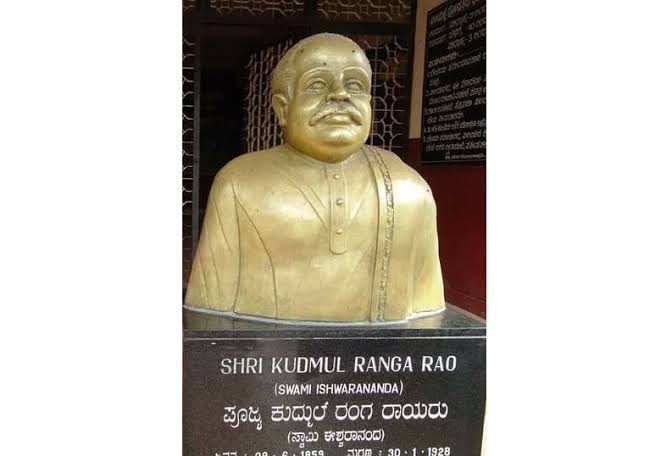Only Ambedkar, Nobody Else?
It was 1897, a Brahmin lawyer from Kudumul, a village near Mangalore established #Depressed_Classes_Mission in Mangalore for providing education, better housing, drinking water and empowering the backward classes socially by guarding them against
It was 1897, a Brahmin lawyer from Kudumul, a village near Mangalore established #Depressed_Classes_Mission in Mangalore for providing education, better housing, drinking water and empowering the backward classes socially by guarding them against

exploitation by upper classes.
#Kudumul_Rangarao was born on 29 June 1859 and passed away on this day in 1928.
For his selfless service, he got the name
Rangarao completed his primary education in Kasaragod, before losing his father when he was 16. Moving to Mangalore in
#Kudumul_Rangarao was born on 29 June 1859 and passed away on this day in 1928.
For his selfless service, he got the name
Rangarao completed his primary education in Kasaragod, before losing his father when he was 16. Moving to Mangalore in
search of a job, he began working as a teacher for a monthly salary of ₹8. Completing his matriculation amid financial difficulties through a correspondence course, he cleared the pleadership examination, that certified him argue for a client in courts. Following this, he began
his career as a lawyer in Mangalore.
Rangarao as an advocate in profession was better known as "The poor man's lawyer".
"Education is the source of progress'' was his tenet.
At a time when the depressed classes had no schools, when they were treated with scorn, Rangarao stepped
Rangarao as an advocate in profession was better known as "The poor man's lawyer".
"Education is the source of progress'' was his tenet.
At a time when the depressed classes had no schools, when they were treated with scorn, Rangarao stepped
forward as a crusader for the cause. Albeit facing grave opposition, Kudmul Rangarao continued to combat the orthodox beliefs of the then superstitious Indian society.
Bearing the cost of being outcast from his community, ridiculed and reprimanded for standing up for the Dalits,
Bearing the cost of being outcast from his community, ridiculed and reprimanded for standing up for the Dalits,
even stoned at in public often by fellow ‘high caste’ kids, he saw education as the only tool of empowerment.
Rangarao set up schools in Kankanadi, Bannanje, Moolkhi, Udupi, Nejaru, Atthavara, Baabuguddde, Dhaddal forests for the downtrodden. He called them 'Panchama schools'.
Rangarao set up schools in Kankanadi, Bannanje, Moolkhi, Udupi, Nejaru, Atthavara, Baabuguddde, Dhaddal forests for the downtrodden. He called them 'Panchama schools'.
“ A Dalit boy who studies in my school should join public service and his car should move around on our village roads. When the dust that then rises touches my head, I shall consider my life worthwhile.” - These were his words & etched on a memorial in Mangalore 

To persuade the kids to attend schools, he arranged for mid day meals and 2 paise per day to the parents to develop an interest and motivate the families to get their progeny to schools.
It is said that he bathed the young kids, sat with them for lunch, slept in their huts to
It is said that he bathed the young kids, sat with them for lunch, slept in their huts to
win over their hearts. He freed many servants and slaves from the clutches of demanding and barbarous masters. Despite being threatened myriad times, his grit and gusto could not be dampened.
By marrying off his own widowed daughter,Radhabai to P. Subbarayan, the zamindar of
By marrying off his own widowed daughter,Radhabai to P. Subbarayan, the zamindar of
Kumaramangalam, he set an example of inter-caste marriage and Widow Re-Marriage in India.
Following his inspiration, M K Gandhi's son entered wedlock with Chakravarthi Rajagopalachari's daughter.
M K Gandhi had once said, "I discerned social loyalty from Mr. Rangarao.
Following his inspiration, M K Gandhi's son entered wedlock with Chakravarthi Rajagopalachari's daughter.
M K Gandhi had once said, "I discerned social loyalty from Mr. Rangarao.
He is an inspiration & a guide for me. He is my teacher when it comes to the upliftment of the untouchables".
Rangarao taught the Gayatri mantra to children from backward classes at Bhajana Mandirs he built for them in all the colonies and ensured they won't get trapped by
Rangarao taught the Gayatri mantra to children from backward classes at Bhajana Mandirs he built for them in all the colonies and ensured they won't get trapped by
Missionaries.
In death too, as in life, he set an example. He willed it that his final rites be done only by those considered lowest even among the untouchables and thus it was done.
#ಕುದ್ಮುಲ್_ರಂಗರಾಯರು
#Kudmul_Rangarao
#Punyasmaran
#VANDEMATARAM

In death too, as in life, he set an example. He willed it that his final rites be done only by those considered lowest even among the untouchables and thus it was done.
#ಕುದ್ಮುಲ್_ರಂಗರಾಯರು
#Kudmul_Rangarao
#Punyasmaran
#VANDEMATARAM


• • •
Missing some Tweet in this thread? You can try to
force a refresh














